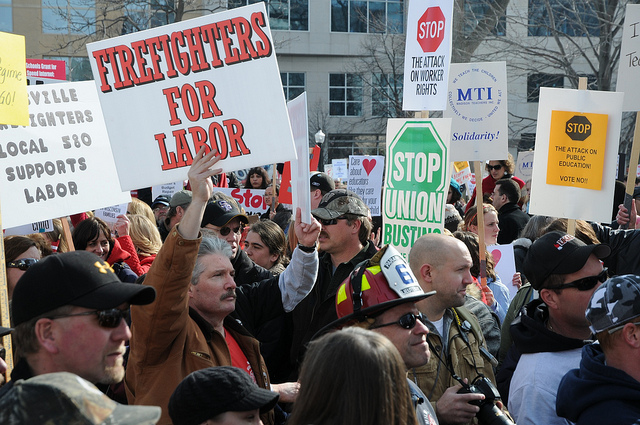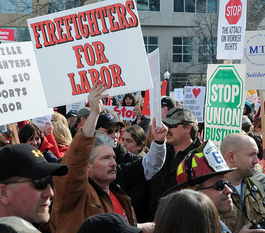Protesters at the Wisconsin state capitol have been opposing a proposed budget-repair bill since early last week that would cut government workers’ pay, benefits and bargaining rights. The bill would directly affect the collective bargaining rights of thousands of University of Wisconsin – Madison professors and staff along with the university’s hospital and clinic workers.

Junior Taylor Heinlein, president of the St. Thomas College Republicans, said he thinks St. Thomas students would disapprove of the legislation, but he added that he has seen different levels of student involvement in political activities.
“There are definitely students here on campus who would go out and protest,” Heinlein said. “But when it came to volunteering and campaigning for different candidates in the fall, the participation was far lower than the attendance at meetings.”
Wisconsin Gov. Scott Walker tried to elicit support from Democrats for the bill, and he has insisted it is necessary to help eliminate the financial troubles of the state. But 14 Senate Democrats left Wisconsin for Illinois more than a week ago, and said they will not return until a compromise is reached.
“The worst part is that Scott Walker refuses to hear the voice of the people,” said Kate Wallner, a University of Wisconsin-Madison freshman who protested. “This protest is not about money, it is about the respect that the people of Wisconsin deserve.”
Wallner is one of more than 10,000 people who have participated in the protests.
Tyler Petersen, president of the St. Thomas College Democrats, said younger people sometimes get a bad rap for being uninformed about political issues.
“There’s a common misconception that college students, or the youth demographic in general, are disinterested in politics, and I don’t think that’s true at all,” Petersen said. “It’s just a specific demographic you need to target, and President Obama’s 2008 campaign is an example of this.”
James Sawicki, a sophomore electrical engineering student at UW-Madison, said he is very interested in the protests, but his schoolwork consumes his time. Instead, he stays involved in other ways.
“In my limited free time, I have felt I could best contribute to the situation by debating the issues personally with people,” Sawicki said.
Sawicki said many of his friends are conservative and don’t see a problem with the bill. He added that his family members do not live close enough to protest, and their jobs are not directly affected by the bill in question.
UW-Madison is not sponsoring any of the students or groups who are protesting. Petersen said St. Thomas would not sponsor students or groups either.
While Petersen said he doesn’t see this as a bad thing, he said his group is constrained because it is funded and chartered through the university.
“We even learned during the elections there are certain campaign things that we cannot say the St. Thomas College Democrats are sponsoring,” Petersen said. “What we can do is talk about these issues and present to our members ways in which they can be involved, or point students in the right direction if they would like to be more active.”
Heinlein also passes on information to students about protests and encourages students to go if they feel strongly enough about the issue, but he said he would not want university sponsorship for his club to attend these events.
“I don’t want to represent the school in a way they don’t want to be represented,” Heinlein said. “In the last election, the student body’s votes seemed to indicate close to a 50-50 split between the parties, so one voice clearly wouldn’t represent the university.”
Christine Igielski, administrative assistant for the St. Thomas history and political science departments, has family ties to the Wisconsin protests. Her son and daughter-in-law are both elementary education teachers in Madison and have been protesting at the Capitol. Igielski thinks students, and citizens in general, have an obligation to actively participate in democracy.
“If you don’t [speak out], then everyone will ride right over you, and then what voice do you have?” Igielski said. “It’s like not going out to vote. What right do we have to say anything if we have not at least made an attempt to make an informed judgment on people who are going to be our designated leaders?”
Wallner said she’s passionate about the issue.
“I have written to my leaders, protested at the capitol, gathered at rallies, testified in front of the assembly and have been interviewed speaking about the situation in Madison,” Wallner said.
Wallner said she’s noticed a positive element stemming from the protests: Civil discourse is not dead in this country.
“I have not heard one foul word passed from protester to protester,” Wallner said. “Last Saturday people supporting the bill came to Madison. There was no violence, and some people even directly asked questions to people holding the opposing view, trying to see from the other side.”
Dan Cook can be reached at cook9156@stthomas.edu.


I would first like to begin saying I am was a WI resident before coming to Minnesota for school, and all I have to say is the gravy train has ended. The tactics the public unions have been using to milk WI taxpayers are about to come to an end and its about time. The thing I find most dumbfounding about this situation is that while Obama has contended that the “union busting needs to stop”, then why doesn’t the Federal Govt. let their employees collectively bargain? Why do WI public employees currently pay absolutely nothing towards their healthcare or pension? I think it would be interesting to compare how Minnesota and Wisconsin state employee benefits differed. You would be dumbfounded as to the difference.
Many people are quite misinformed about this issue and I would think it to be much better to quote a much more educated individual about unions, budgets, and public sector employees than a politically charged student at the UW-Madison. If the 14 cowards come back to the state of WI to let this pass, I think it will be a lesson of political civility for the entire nation.
I think calling them cowards doesn’t really help the political civility issue
“[A]ll I have to say is the gravy train has ended. The tactics the public unions have been using to milk WI taxpayers are about to come to an end and its about time.”
I take it that you are suggesting that public workers either earn more than they are entitled to or are placing an unfair burden on taxpayers. Both claims are false. Public sector workers in Wisconsin, on average, earn 5% less in total compensation than similarly situated private sector workers (http://www.epi.org/economic_snapshots/entry/wisconsin_public_servants_already_face_a_compensation_penalty/). Despite this disparity, unions in Wisconsin have already agreed to both double public employee contributions to health care plans and require public employees to contribute roughly 6% of their income to cover half of their pensions (http://www.jsonline.com/blogs/news/116502958.html). In exchange for these concessions, unions have asked that they retain their collective bargaining rights. This would put them on par with Minnesota public workers, who also have the right to collectively bargain (http://www.startribune.com/politics/local/116784878.html). Although these concessions would balance the budget in Wisconsin, Governor Walker has rejected the unions’ offer.
“Many people are quite misinformed about this issue and I would think it to be much better to quote a much more educated individual about unions, budgets, and public sector employees than a politically charged student at the UW-Madison.”
As a current graduate student in the University of Wisconsin system, as a member of the union representing teaching assistants, and as a public employee who will be affected by Governor Walker’s “budget repair” bill, I can assure that students in the UW system are fully informed about unions, public employees, budget problems in Wisconsin, and how the proposed “budget repair” bill will affect us and higher education in our state.
Also – to say that the public in WI pays the pension of the public workers is another gross misconception perpetuated by Walker and dutifully reported by much of the media: Pensions are a benefit the workers have, that have been negotiated right along with salary. In many cases, workers have in the past forgone or reduced there salary-based compensation to increase or just maintain their pension benefit. Workers are not “given” their pension, they earn it.